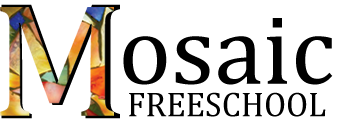|
with Rich Piscopo February 24 - Potential and Existence During our review of the 2/17/14 class, inter-concentric connectedness was again discussed. In one student's notes from the same class, she asked that if someone is part of their parents, didn't that someone always exist [as potential]? Another responded to this by asking about people who were not yet born. She wondered if they existed [as potential]. Then yet another said, "Even when you die, you still exist because you are a part of everyone who knew you." We then called for a definition of existence. The facilitator asked if the definition of existence included becoming. One student in response to the previous comment said, "Even if a picture of you exists, you still exist after you die." At this point, in response to the call for a definition of existence, another said, "There's a difference between existence and living." He went on to say that living is a sub-category of the larger category of existence. In response to this, we heard, "So, if you live in a box, you're not existing." Playing off of this statement, another student said, "If your life is meaningless, you might as well be dead." Then a different student said, "Everyone has a purpose, even if they are unaware of it." He went on to say that our lives are inherently meaningful. One in response said, "We have unlimited potential at every moment." This comment led to a flurry of dialogue, with the group generally agreeing that we are constantly evolving. We are free at every moment to fulfill our potential. We are free at every moment to become the person we want to be! March 3 - Facts and Knowing What is a fact? I began our dialogue by giving some philosophical background to this query. I drew heavily on Bertrand Russell's book, The Problems of Philosophy, especially chapter one, "Appearance and Reality." Russell says we do not really see anything. What we really perceive are particles of light striking our retinas, and we infer what the object of our sight is. What we perceive is what Russell calls "sense-data," not the object itself. We make an association between the sense-data and the object. We do not know the object inherently, as it is in and of itself. So, if we cannot know anything inherently, how do we know what is objectively true; how do we know what a fact is? In class, I used the example of observing my green water bottle. Since, according to Russell, we can only infer that the object of our sight is a green water bottle, how can we be absolutely certain we're all observing the same green water bottle? I suggested one way to ascertain what we're seeing is to describe it to one another. We can compare our experiences and see if they correspond to the object in question -- this is the correspondence theory of truth. Although our judgment may not be absolutely certain, it would be highly probable that we are all observing the same object. But, as one student asked, how can we be certain we are talking about the same shade of green when we refer to "that green water bottle?" He said there is too much room for misinterpretation. I suggested that with so much room for misinterpretation, can we ever arrive at the objective, absolute facts connected to that water bottle? He then said we can only arrive at assumptions about the water bottle. One student responded, "Extremely probable assumptions." And another added, "Based on the past." To give our inquiry more meaning, I applied our process to the real-life circumstance of a jury involved with a murder trial weighing the evidence presented to them during the trial. I referred to the superb film, Twelve Angry Men (the 1957 monochrome version). I asked, "So, when juries arrive at a verdict, do they do so with absolute certainty?" The class unanimously said, "No. They make an assumption." Then a student said, "But assumptions are necessary." Another added, "You get as much proof as possible." I asked her, "You mean you arrive at a reasonable assumption?" Before she could answer, another asked, "Is there absolute reason, or is everything an opinion? How do we know if reason is 'reasonable'?" He then went on to describe a hierarchy of reason, with pure reason at the top and various gradations of opinion falling in order below it. A student then asked, "If there is no such thing as a fact, how can you have pure reason?" He responded by asking if reason could be broken down to numbers. She demanded he define his terms: what did he mean by "reason"? He answered, "That which has the most evidence in favor of it is reason." Another then asked, "How do we make decisions, then? If the only system we can test reason with is reason, how do we know it's valid?" I suggested we cannot, because a system cannot analyze itself with certainty. However, we can agree to its universality, and still utilize it. There was a long, reflective pause within the group. I complimented them at arriving at this intellectually honest and philosophically pure state of mind. It is a very valuable state of mind. It is one where one does not make any assumptions or jump to any conclusions. One is open. One is receptive. One's "cup is empty." After another reflective pause, a student said, "It's weird. Every thought I have is not new." Another added, "We take parts of what everyone else said before us." Then yet another said, "If everyone is using everyone else's stuff, where did it all start?" Then this was stated, "We're all part of a mosaic." To this was added, "And our mosaic is part of an even larger mosaic." Then, "Every thought is a hand-me-down." (I had been waiting to ask): "Are there any original thoughts, then?" All said no. Then one reconsidered and asked that we define "original." He said, "If original means a synthesis of what came before, then, yes, we can be original." And another student then said, "What about instincts? Could they be original?" To which another said, "Instincts are undeveloped thoughts." Before we left, I reminded everyone of an ancient quote, "There is nothing new under the sun, only new contexts." Comments are closed.
|
Categories
All
Archives
May 2016
|

 RSS Feed
RSS Feed